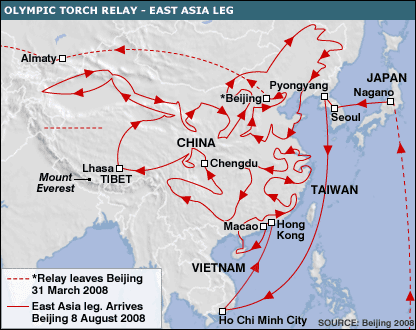Korea Times
Andrei Lankov
12/9/2007
By 1963, the inhabitants of the huge Soviet Embassy compound in downtown Pyongyang felt themselves under siege. All their communications with Koreans were supervised, and most North Koreans who had expressed some sympathy with Moscow had disappeared without a trace. Soviet aid nearly stopped, and most Soviet advisors left the North. On quite a few occasions, the official media of North Korea and Soviet Russia exchanged broadsides of sharply worded critical statements.
In short, in 1963-65 few people doubted that North Korea, together with Albania and, to a lesser extent, North Vietnam, chose to side with Beijing in its quarrel with Moscow. There were good reasons for this: Moscow was too liberal in its domestic policies, too disdainful of Kim Il-sung’s personality cult, too ready to compromise with the arch-villain of U.S. imperialism. And it was prone to an arrogant attitude in its dealings with the small East Asian country, too.
But then things changed, dramatically and irreversibly. The anti-Soviet pro-Maoist block, clearly in the making in the early 1960s, felt apart in 1966-67. The reason was the Cultural Revolution, the ten years of madness, which engulfed China. Some people believe that there was a system in this madness. Perhaps. But I personally find this system extremely difficult to discover.
It was not the only “cultural revolution,” of course. The Vietnam War demonstrated that China, despite its bellicose rhetoric, was unable to provide enough aid. The Russians provided Hanoi with missiles and tanks while the Chinese largely limited themselves to shipping the “little red books” full of Mao’s quotations.
But it was the “cultural revolution” that played the major role in the alienation between Korea and China. Kim Il-sung was perplexed by the new developments in his sponsor country. Everything looked like madness, and in September 1966 the Cuban Ambassador noticed that North Korean top officials began to make jokes about China and Mao the Great Helmsman himself (they suggested that a bit of Korean ginseng would help the Chinese leader who was obviously becoming senile).
Around the same time, in late 1966, the internal propaganda of North Korea began to criticize “dogmatism” and “superpower chauvinism,” clearly associated with China. For years, the major culprit in the internal propaganda was the “modern revisionism” (read: the Soviet Union). In December 1966, at a secret meeting with the Soviet leader Brezhnev, Kim Il-sung described the “cultural revolution” as a “massive idiocy.” Well, he was probably correct, even if his own policies were not exactly an embodiment of wise statesmanship.
At that stage, China still could play down the differences and probably keep North Korea on its side. But it seems that Beijing was not in control of the situation, or was not able to make reasonable decisions, so in early 1967 the Chinese press began to attack Kim Il-sung. Throughout 1967, the Red Guards newspapers frequently called Kim Il-sung a “revisionist,” the worst term of abuse in their (quite limited) vocabulary. He was accused of “blocking the revolutionary will of masses” and not starting a cultural revolution in his realm.
In early 1967, the Red Guards’ media reported an alleged attempted coup in Pyongyang. As far as we know, the story was a complete fake, but it prompted the North Korean press to react. In January 1967, Nodong Sinmun rebuffed the statements.
The propaganda war escalated. It was meaningless from the Chinese point of view: in its feud with the USSR China needed as many allies as possible. But it seems that the considerations of real politick were rejected by the zealots who required a complete adherence to the then current Chinese political line. Kim Il-sung and his entourage were not famous for their readiness to follow foreigners’ advice, so the situation went from bad to worse.
Bernd Schaefer penned a wonderful monograph based on the now de-classified East German archives, and noted some rather extreme episodes in the late 1960s. In the summer of 1968 the Chinese installed loudspeakers on the border and used them to blast North Korea with Chinese propaganda, largely with tales about the unparalleled wisdom of Mao. The Koreans retaliated in kind, by installing their own loudspeakers and bombarding their opponents with stories of Kim Il-sung’s greatness and superhuman wisdom.
The Chinese accused Kim Il-sung himself of enjoying a luxurious life, very different from the lifestyle of his subjects. This was correct, even if the same thing could be said about Mao. However, these personal accusations made Kim even less willing to accommodate the Chinese.
On one occasion, a group of Chinese soldiers crossed the border, obviously in hope of provoking a clash, but the North Koreans did not react and Chinese soon withdrew. There were also reports that bodies of ethnic Korean officials who were slaughtered in China by the Red Guards were put on a train and sent to the North. Personally, I am somewhat skeptical, but this story was indeed reported in the contemporary diplomatic messages cited by Bernd Schaefer and thus might be true.
Relations reached their nadir in late 1968. However, Kim Il-sung understood that his best policy would be a balancing act between the two Communist great powers, and he was ready to find a path to rapprochement. Fortunately for him, China was gradually coming to some semblance of normality, so from around 1970 it was once again possible to resume the balancing act policy. But that is another story.

